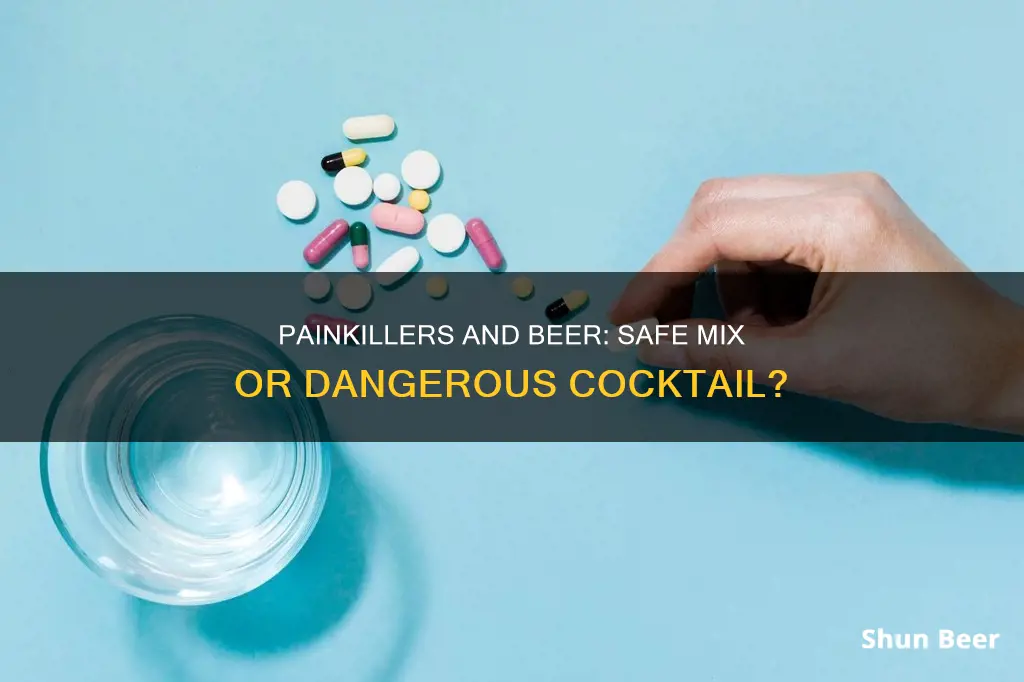
Mixing alcohol and painkillers is generally not advised, as it can lead to serious adverse reactions. The specific risks vary depending on the type of painkiller and the amount of alcohol consumed. Over-the-counter painkillers such as ibuprofen and paracetamol are usually considered safe in moderation, but can cause gastrointestinal bleeding and other issues if taken in large doses or combined with excessive alcohol. Prescription painkillers, especially opioids, are more dangerous when mixed with alcohol and can lead to breathing problems, comas, and even death. It is always best to consult with a doctor or pharmacist about the specific medications and their potential interactions with alcohol.
| Characteristics | Values |
|---|---|
| Is it safe to mix painkillers and alcohol? | It depends on the type of painkiller. |
| Over-the-counter painkillers | Paracetamol, ibuprofen, and aspirin are usually safe in small amounts. |
| Prescription painkillers | It is not recommended to mix alcohol with prescription painkillers such as tramadol, codeine, dihydrocodeine, gabapentin, morphine, and pethidine. |
| Effects of mixing alcohol and painkillers | Increased side effects such as drowsiness, impaired breathing, decreased oxygen in the blood, coma, and even death. |
| Risks | Organ damage, loss of consciousness, addiction, and accidental overdose. |
| Prevention | Abstain from alcohol, consult a doctor or pharmacist, and read medication labels. |
What You'll Learn
- Ibuprofen and alcohol can cause gastrointestinal bleeding and kidney problems
- Acetaminophen and alcohol can cause liver damage
- Naproxen sodium and alcohol can cause stomach bleeding
- Aspirin and alcohol can cause internal bleeding, stroke, or kidney failure
- Prescription opioid painkillers and alcohol can cause breathing impairment, decreased blood oxygen levels, coma, and death

Ibuprofen and alcohol can cause gastrointestinal bleeding and kidney problems
Ibuprofen is a nonsteroidal anti-inflammatory drug (NSAID) that is easily accessible over the counter. It is a popular medication for relieving pain, swelling, and fever. While occasional use of ibuprofen with alcohol may not be harmful, regular consumption of both can have adverse effects on your stomach and kidneys.
Ibuprofen, when taken regularly with alcohol, can significantly increase the risk of gastrointestinal bleeding. This risk is further heightened in individuals who are heavy drinkers. A study involving 1,224 patients hospitalized for acute upper gastrointestinal bleeding revealed that the relative risk of bleeding increased with higher alcohol consumption, reaching 2.8 in heavy drinkers. Regular use of ibuprofen, in conjunction with alcohol, was found to elevate the relative risk of gastrointestinal bleeding. Therefore, it is crucial to refrain from regularly consuming ibuprofen with alcohol to mitigate the chances of experiencing this severe side effect.
Long-term use of ibuprofen, especially when combined with alcohol, can also pose a serious threat to kidney health. Both ibuprofen and alcohol can individually cause harm to the kidneys, and their combined use amplifies this risk. It is important to be vigilant for any signs of kidney issues, such as swelling in the hands, feet, or ankles.
The combination of ibuprofen and alcohol can also lead to other adverse effects, such as an upset stomach, nausea, and vomiting. Additionally, this mixture can impair driving ability, causing drowsiness, slowed reaction times, and an increased risk of falling asleep.
To ensure safe use, it is recommended to consult a doctor or pharmacist before consuming alcohol while taking ibuprofen, especially for those with pre-existing liver or kidney problems. They can provide personalized advice based on individual risk factors. It is important to prioritize health and be aware of the potential risks associated with mixing ibuprofen and alcohol.
Beer Trading: How Does It Work?
You may want to see also

Acetaminophen and alcohol can cause liver damage
It is not recommended to consume alcohol and painkillers simultaneously. Even the combination of alcohol and over-the-counter medications can lead to severe health problems. Mixing alcohol and prescription painkillers is especially dangerous and can even be deadly.
Acetaminophen (paracetamol, Tylenol) is a commonly used pain reliever that can be purchased over the counter. It is generally advised that you do not take acetaminophen while drinking alcohol. Both substances are broken down in the liver, and excessive consumption of both can irritate the stomach and, in severe cases, cause ulcers, internal bleeding, and liver damage.
Acetaminophen alone can cause toxic damage to the liver, known as acetaminophen-induced hepatotoxicity, which is the most common cause of acute liver failure in the United States. When alcohol is also in the picture, it increases the activity of the CYP2E1 liver enzyme, leading to higher production of the NAPQI toxin. Additionally, alcohol decreases the production of glutathione, an antioxidant that helps remove NAPQI before it can build up to dangerous levels in the liver. This combination of factors increases the risk of severe side effects, especially for those with alcohol use disorder (AUD).
To reduce the risk of liver damage, it is important to follow the recommended dosage for acetaminophen, which is no more than 3,000 mg per day for adults, or 650-1,000 mg every 4-6 hours. It is also crucial to check the ingredients of other medications to ensure they do not contain acetaminophen and to avoid taking multiple acetaminophen-containing products simultaneously.
Antibiotics and Beer: A Safe Mix?
You may want to see also

Naproxen sodium and alcohol can cause stomach bleeding
Naproxen is a non-addictive non-steroidal anti-inflammatory drug (NSAID) that can be highly beneficial in treating issues such as inflammation or pain in the muscles and joints. It is deemed generally safe to consume alcohol while taking naproxen, as long as both substances are consumed in moderation. However, drinking large quantities of alcohol alongside naproxen use may lead to adverse side effects.
Naproxen, as an NSAID, can interfere with the hormones needed to protect the stomach lining. Similarly, alcohol can increase the volume of acid in the stomach, leading to irritation and soreness. Therefore, consuming both substances simultaneously can put individuals at a heightened risk of gastritis, a condition that causes the stomach lining to become inflamed. This can lead to uncomfortable symptoms such as nausea, vomiting, and abdominal pain.
The risk of stomach bleeding also increases when combining naproxen and alcohol, especially in individuals over 60 years of age. Additionally, long-term use of naproxen or taking it in large doses can cause ulcers in the stomach or gut, further elevating the risk of bleeding. If you have a history of stomach ulcers or bleeding, it is crucial to consult a doctor before using naproxen and alcohol together.
To minimise the risks associated with mixing naproxen and alcohol, it is recommended to follow the recommended dosage and duration of naproxen use and to drink alcohol only in moderation. If you experience any signs of stomach problems, such as an upset stomach that doesn't go away or blood in your vomit, it is important to contact your doctor immediately.
Drinking Beer at Dollywood: What You Need to Know
You may want to see also

Aspirin and alcohol can cause internal bleeding, stroke, or kidney failure
Drinking alcohol and taking painkillers is a potentially life-threatening combination and should be avoided. Alcohol can interfere with some drugs, making them less effective, and can also intensify their side effects.
Aspirin is a common over-the-counter pain reliever that is often taken for headaches, toothaches, joint and muscle pain, and inflammation. It is also prescribed to reduce fevers and relieve mild to moderate pain. While taking aspirin once in a while for pain is beneficial to your health, there are several side effects associated with its use, which may worsen with alcohol consumption.
Mixing aspirin and alcohol can result in certain types of gastrointestinal distress, including nausea and vomiting. The combination can also cause or worsen ulcers, heartburn, or stomach upset. In addition, both substances independently put stress on the liver, and when combined, they can substantially increase the risk of liver damage.
The most serious consequence of mixing aspirin and alcohol, however, is the increased risk of internal bleeding. Since aspirin is a blood thinner and alcohol increases blood pressure, you may experience prolonged gastrointestinal bleeding. The more alcohol you consume, the thinner your blood becomes, which can lead to significant and life-threatening bleeding.
To minimize the risk of internal bleeding, liver damage, and other adverse side effects, it is best to avoid drinking alcohol when taking aspirin. If you plan on drinking in the evening, take your aspirin in the morning to minimize the effects. Always consult your doctor before mixing alcohol with any medication, including aspirin.
Beer Breakdown: Understanding Its Effect on the Human Body
You may want to see also

Prescription opioid painkillers and alcohol can cause breathing impairment, decreased blood oxygen levels, coma, and death
Combining alcohol with certain types of painkillers can have severe health consequences. While over-the-counter painkillers such as ibuprofen and paracetamol are usually safe to take with moderate amounts of alcohol, prescription opioid painkillers are a different story.
Prescription opioid painkillers, such as hydrocodone, oxycodone, and hydromorphone, have a chemical composition similar to heroin. When combined with alcohol, the effects of both substances are amplified, leading to serious adverse reactions. Both alcohol and opioid medications can slow breathing by depressing the central nervous system. When taken together, this effect is intensified, leading to breathing impairment, decreased blood oxygen levels, coma, and even death.
The combination of alcohol and prescription opioid painkillers can also increase the risk of addiction. Alcohol enhances the euphoric and pleasure-inducing effects of opioids, making the risk of dependency and negative health impacts more likely. Furthermore, alcohol consumption significantly raises the risk of an opioid overdose, which can be fatal.
It is crucial to heed the warning labels on medication and abstain from alcohol whenever taking prescription opioid painkillers. Even a small amount of alcohol can put your health at serious risk, and emergency medical care may be required if breathing and heart rates slow, and oxygen levels drop. To ensure safe medication management, consulting with a doctor or pharmacist is always recommended.
Drinking Beer Legally in Dry Counties: What's Allowed?
You may want to see also
Frequently asked questions
It depends on the type of painkiller and it is recommended to consult a pharmacist or doctor. Over-the-counter painkillers such as paracetamol or ibuprofen are usually safe in moderate amounts, but prescription-only painkillers such as tramadol or codeine are not recommended and can increase side effects such as drowsiness.
Mixing alcohol with painkillers can cause serious adverse reactions, including organ damage, loss of consciousness, and even death. Alcohol can also interfere with the effectiveness of painkillers and intensify their side effects.
Common over-the-counter painkillers such as ibuprofen, acetaminophen, and aspirin can cause serious side effects when mixed with alcohol. For example, ibuprofen can increase the risk of gastrointestinal bleeding, while acetaminophen can cause liver damage when mixed with alcohol.
Prescription painkillers, especially opioid drugs, can have hazardous results when mixed with alcohol. Opioids and alcohol can both slow breathing, and when combined, this effect is amplified, leading to serious breathing impairment, decreased oxygen in the blood, coma, and even death.
The best way to avoid serious illness or injury is to abstain from drinking alcohol completely while taking painkillers. Even a single social drink could be risky. Consult with a doctor or pharmacist for specific instructions on alcohol consumption and medication management.







